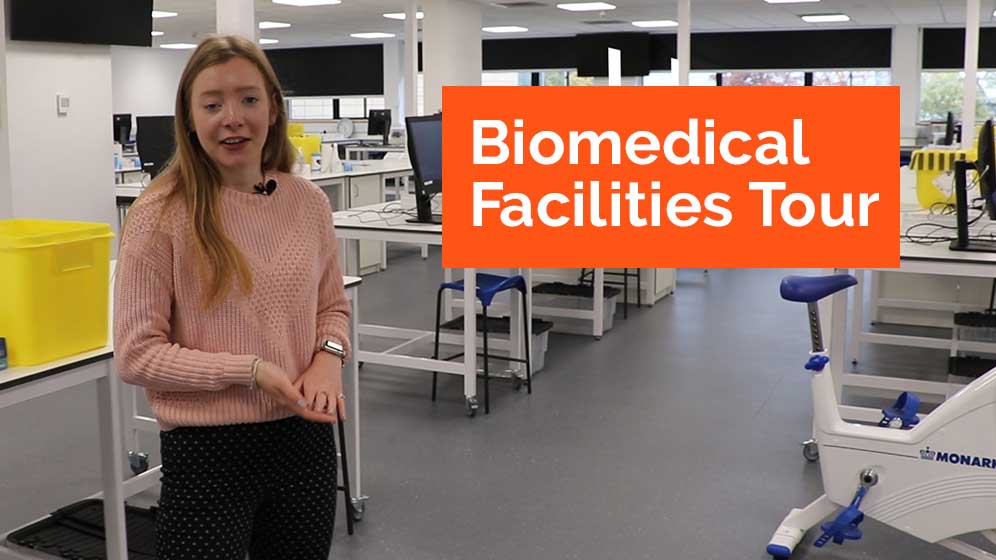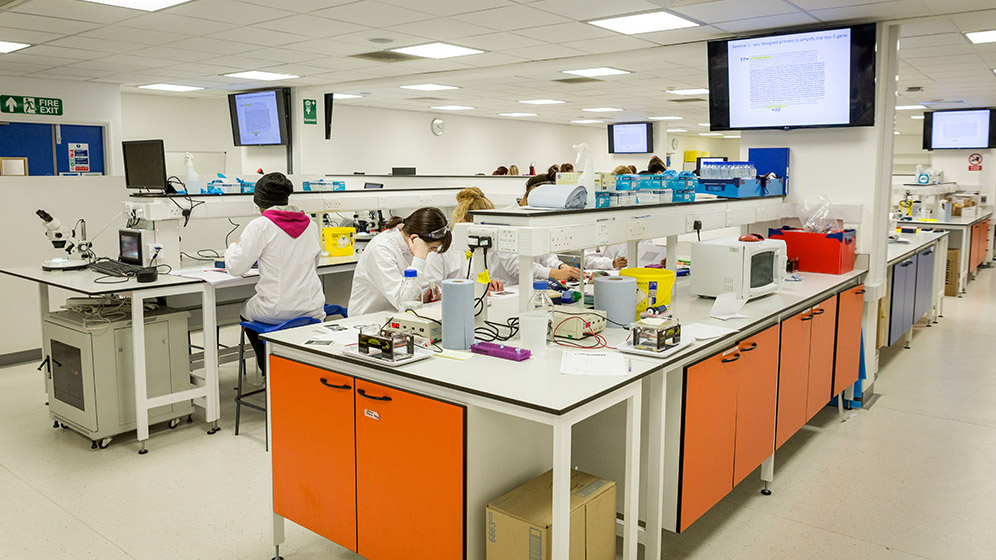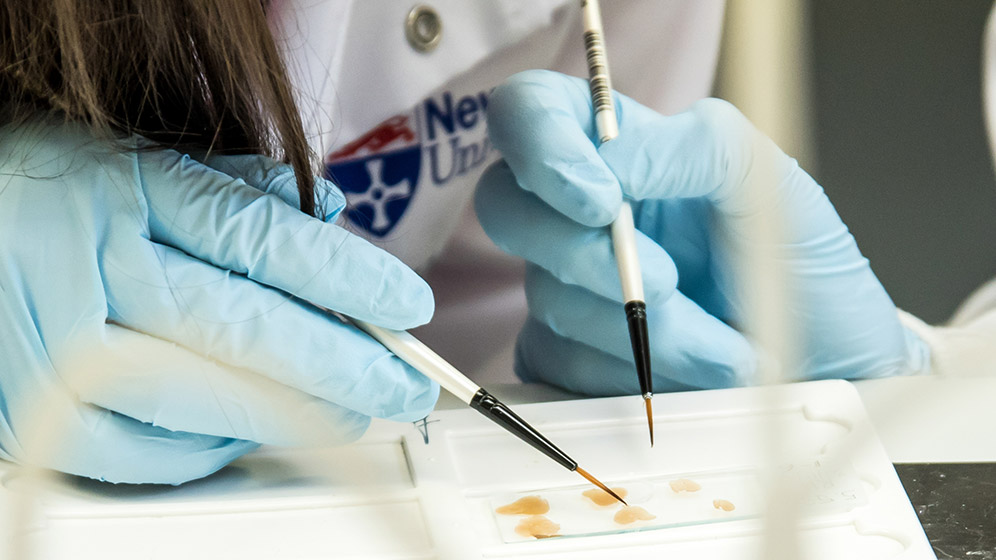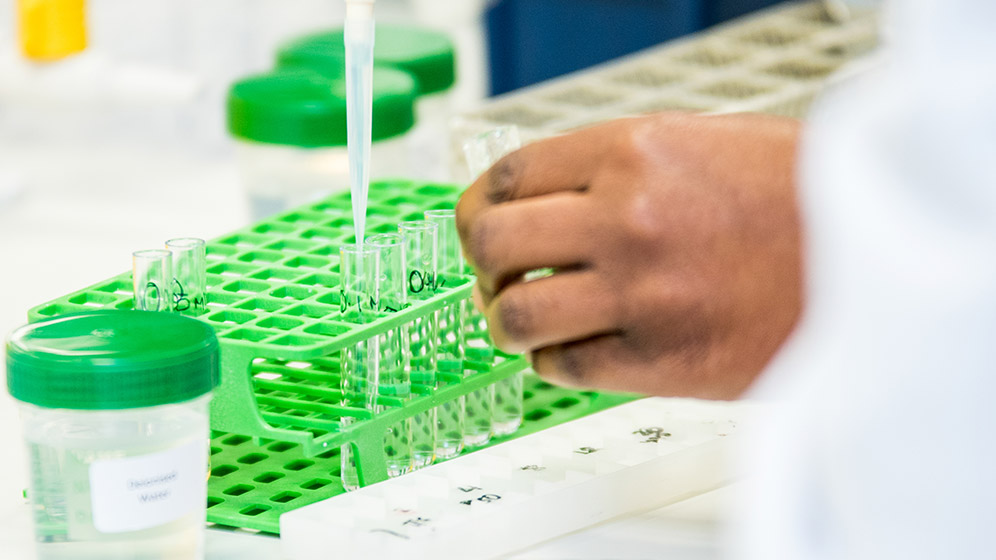
This accredited Biomedical Sciences degree explores the human body’s function in health and disease. It equips you with specialist knowledge about how diseases occur, and how researchers and clinicians develop new treatments.
You are currently viewing course information for entry year: 2025
Next start date:
Fees (per year)
Entry requirements and offers
UCAS Institution name and code:
Each year, universities may have spaces left on their courses after the application window has closed in June.
UCAS Clearing is your opportunity to snap up one of these places, even if you didn't apply to the university prior to the June deadline.
It also gives you a second chance to go to university if you didn't get the grades you needed for your firm and insurance offers.
Our Clearing entry requirements may differ from those advertised; contacting our friendly advisers is the best way to find out if you’re eligible for a place.
You can get in touch through live chat or our hotlines. Call us on 0800 073 5050, or if you’re an international student calling from outside the UK, call: +44 191 222 5000.
Not available in Clearing
This course is not available in Clearing 2024.
This means there are no spaces available for Clearing 2024. If you can't find vacancies in your original course or subject area, try exploring other subjects in a related field.
This degree develops your understanding of how the human body functions in health and disease, and ensures you graduate well prepared to make a difference in modern biomedical research and/or medicine.
We're a National Centre of Excellence in biomedical research and our world-leading expert staff teach at all levels on our degree programmes. This means you graduate with the latest knowledge in human health and disease.
You’ll explore the links between:
By gaining an understanding of research in these areas, you'll learn how we can develop either preventative approaches or new treatments for a range of common diseases, such as Alzheimer’s, autoimmunity, cancer, and diabetes.
Some of our degrees are offered at two levels:
Our MSci degrees include an additional year of advanced study at master’s level, where you will gain additional research and practical experience to increase your employability and have the opportunity to work alongside our world-leading experts.
Your course and study experience - disclaimers and terms and conditions
Please rest assured we make all reasonable efforts to provide you with the programmes, services and facilities described. However, it may be necessary to make changes due to significant disruption, for example in response to Covid-19.
View our Academic experience page, which gives information about your Newcastle University study experience for the academic year 2024-25.
See our terms and conditions and student complaints information, which gives details of circumstances that may lead to changes to programmes, modules or University services.
All professional accreditations are reviewed regularly by their professional body.
There is flexibility to transfer between our degree programmes at the end of the first year if you find your interests change.
You can also apply to transfer to our Medicine or Dentistry degree. This opportunity is open to UK, EU and international students. It is competitive, with a limited number of places available. Students are selected on the basis of academic performance in the first year, a UCAT score, a personal statement and, if shortlisted, an interview.
The information below is intended to provide an example of what you will study.
Most degrees are divided into stages. Each stage lasts for one academic year, and you'll complete modules totalling 120 credits by the end of each stage.
Our teaching is informed by research. Course content may change periodically to reflect developments in the discipline, the requirements of external bodies and partners, and student feedback.
Optional module availability
Student demand for optional modules may affect availability.
Full details of the modules on offer will be published through the Programme Regulations and Specifications ahead of each academic year. This usually happens in May.
All of our Biomedical and Biomolecular Sciences degrees are divided into two phases:
This flexible structure gives you the chance to try a broad range of topics, helping you to see where your interests lie before you specialise.
You're introduced to biomolecular sciences through a series of modules.
You'll study topics such as:
| Compulsory Modules | Credits |
|---|---|
| Biochemistry | 15 |
| Genetics | 15 |
| Microbiology and Immunology | 15 |
| Cell Biology | 15 |
| Professional and Practical Skills for Bioscientists | 30 |
| Pharmacology | 15 |
| Physiology | 15 |
All of our Biomedical and Biomolecular Sciences degrees are divided into two phases:
This flexible structure gives you the chance to try a broad range of topics, helping you to see where your interests lie before you specialise.
You're introduced to biomolecular sciences through a series of modules.
You'll study topics such as:
| Compulsory Modules | Credits |
|---|---|
| Cell Biology and Disease | 20 |
| Practical and Presentational Skills in Biomedical Sciences | 10 |
| Essential Biomedical Research Skills | 20 |
| Control of Eukaryotic Gene Expression | 10 |
| Cell and Molecular Biology of the Immune System | 10 |
| Human Anatomy | 10 |
| Optional Modules | Credits |
|---|---|
| Neuroscience: from cell to cognition | 20 |
| Clinical Immunology and Viral Pathogens | 20 |
| The Biology of Ageing | 20 |
| Health and disease at mucosal surfaces | 20 |
| The Principles of Cancer | 20 |
| Structure of the Human Body: an evolutionary and functional perspective (Monash University) | 15 |
| Molecular and Cellular Immunology (Monash University) (External Module) | 15 |
| Molecular Mechanisms of Disease (Monash University) (External Module) | 30 |
If you're studying Semester 2, Stage 2 at Monash University, the Monash modules listed above are compulsory.
All of our Biomedical and Biomolecular Sciences degrees are divided into two phases:
This flexible structure gives you the chance to try a broad range of topics, helping you to see where your interests lie before you specialise.
You're introduced to biomolecular sciences through a series of modules.
You'll study topics such as:
You'll select modules based on your interests, as well as a module designed to boost your professional skills in a relevant employment area. You will also complete a research project in an area linked to your degree that interests you.
| Compulsory Modules | Credits |
|---|---|
| Integrated Biomedical Sciences | 10 |
| Optional Modules | Credits |
|---|---|
| Medical Biotechnology | 20 |
| Business Enterprise for the Bioscientist | 10 |
| Research in Biomedical Sciences | 10 |
| Genetics and Human Disease | 20 |
| Cancer Biology and Therapy | 20 |
| Disorders of the Human Nervous System | 20 |
| Health and Illness: Professional and Societal Perspectives | 10 |
| Science Communication | 10 |
| Clinical Ageing and Health | 20 |
| Chronic Disease | 20 |
| Immunology of Health and Disease | 20 |
| Bioethics | 10 |
| Epidemiology | 20 |
| Bioinformatics | 10 |
| Research Project | 40 |
| Research project for exchange students | 40 |
| Microbiota and pathogens | 20 |
We base these figures and graphs on the most up-to-date information available to us. They are based on the modules chosen by our students in 2023-24.
Teaching time is made up of:
You'll learn through a combination of lectures, practical laboratory classes and small group seminars.
You'll be assessed through a combination of:
Assessments Case studies Coursework Dissertation or research project Examinations – practical or online Group work Practical sessions Presentations Seminar tasks/exercisesIn Stage 3, you'll select a module, designed to boost your professional skills in an employment area that we know many of our graduates progress to, for example:

Experience life in another country by choosing to study abroad as part of your degree. We offer a wide range of destinations and opportunities for students, and we can help you decide which option would work for you (including free language courses before you go, and helping you apply for funding). You’ll be encouraged to embrace fun and challenging experiences, make connections with new communities and graduate as a globally aware professional, ready for your future.
You can choose to spend up to a year studying at a partner institution overseas. You can even take a summer placement in an overseas research laboratory.
Get career ready with a work placement and leave as a confident professional in your field. You can apply to spend 9 to 12 months working in any organisation in the world, and receive University support from our dedicated team to secure your dream placement. Work placements take place between stages 2 and 3.
You'll gain first-hand experience of working in the sector, putting your learning into practice and developing your professional expertise.
If you choose to take a work placement, it will extend your degree by a year, and your degree title will show you have achieved the placement year. A work placement is not available if you're spending a year studying abroad. Placements are subject to availability.
You'll be based in the School of Biomedical, Nutritional and Sport Sciences in the Faculty of Medical Sciences at our city-centre campus. The Faculty is also home to Dentistry, Medicine, Psychology and Pharmacy, making it a vibrant environment for learning and research.
Our facilities include:




You'll have the support of an academic member of staff as a personal tutor throughout your degree to help with academic and personal issues.
Peer mentors will help you in your first year. They are fellow students who can help you settle in and answer any questions you have, when starting university.
We have study skills ambassadors; peers who can help you with your studies including maths support.
We also have Phase Advisors who monitor your academic progress, and in-school Wellbeing Advisors who can help you manage issues affecting you during your studies.
There is a great demand for graduates in the biomedical and biomolecular sciences within the health services and industry, particularly leading or working as part of research teams, and many of our students choose this career path.
A large proportion of our graduates choose to take a further degree either a medical, master's, PhD or teaching qualification, before embarking on permanent employment.
Recent Biomedical and Biomolecular Sciences BSc and MSci Honours graduates have taken up roles such as:
Sectors employing bioscientists include:
Find out more about the career options for Biomedical and Biomolecular Sciences from Prospects: The UK's Official Careers Website.
Sorry, you need JavaScript to view this video
Throughout your studies, there will be many opportunities to engage with industry including:
Develop your employability with the support of the School through:
Our award-winning Careers Service is one of the largest and best in the country, and we have strong links with employers. We provide an extensive range of opportunities to all students through our ncl+ initiative.
From 1 January 2021 there is an update to the way professional qualifications are recognised by countries outside of the UK
All candidates are considered on an individual basis and we accept a broad range of qualifications. The entrance requirements and offers below apply to 2025 entry.
| International Baccalaureate |
|---|
Through one of our contextual routes, you could receive an offer of up to three grades lower than the typical requirements.
International Pathway Courses are specialist programmes designed for international students who want to study in the UK. We provide a range of study options for international students in partnership with INTO.
This policy applies to all undergraduate and postgraduate admissions at Newcastle University. It is intended to provide information about our admissions policies and procedures to applicants and potential applicants, to their advisors and family members, and to staff of the University.
Recognition of Prior Learning (RPL) can allow you to convert existing relevant university-level knowledge, skills and experience into credits towards a qualification. Find out more about the RPL policy which may apply to this course.
The 2025 home fees have not yet been confirmed.
full time 3 years 3 years
Home students starting in 2024 entry
£9,250 is the maximum fee that we are currently permitted to charge for home fee-paying students. This is set by the UK government.
As a general principle, you should expect the tuition fee to increase in each subsequent academic year of your course, subject to government regulations on fee increases and in line with inflation.
Home students starting in 2025 entry
The 2025 home fees have not yet been confirmed.
Depending on your residency history, if you’re a student from the EU, other EEA or a Swiss national, with settled or pre-settled status under the EU Settlement Scheme, you’ll normally pay the ‘Home’ tuition fee rate and may be eligible for Student Finance England support.
EU students without settled or pre-settled status will normally be charged fees at the ‘International’ rate and will not be eligible for Student Finance England support.
If you are unsure of your fee status, check out the latest guidance here.
As a general principle, you should expect the tuition fee to increase in each subsequent academic year of your course, subject to government regulations on fee increases and in line with inflation.
We support our EU and international students by providing a generous range of Vice-Chancellor's automatic and merit-based scholarships. See our undergraduate scholarship page for more information.
For programmes where you can spend a year on a work placement or studying abroad, you will receive a significant fee reduction for that year.
Some of our degrees involve additional costs which are not covered by your tuition fees.
Find out more about:
Find out more about:
You'll have a number of opportunities to meet us throughout the year at our on-campus and virtual open days.
You'll be able to:
• explore our beautiful campus
• find out about our vibrant city
• discover what students think about studying at Newcastle
You'll also have the opportunity to speak to academic staff and find out more about the subjects you're interested in.
We regularly travel overseas to meet with students interested in studying at Newcastle University. Visit our events calendar to find out when we're visiting your region.
To apply for undergraduate study at Newcastle University, you must use the online application system managed by the Universities and Colleges Admissions Service (UCAS). All UK schools and colleges, and a small number of EU and international establishments, are registered with UCAS. You will need:
If you are applying independently, or are applying from a school or college which is not registered to manage applications, you will still use the Apply system. You will not need a buzzword.
International students often apply to us through an agent. Have a look at our recommended agents and get in touch with them.
Call us on +44 (0) 191 208 3333 and press option 1. Our opening hours are Monday to Friday 10am until 4pm.
Our NCL chatbot might be able to give you an answer straight away. If not, it’ll direct you to someone who can help.
You'll find our NCL chatbot in the bottom right of this page.
We regularly send email updates and extra information about the University.